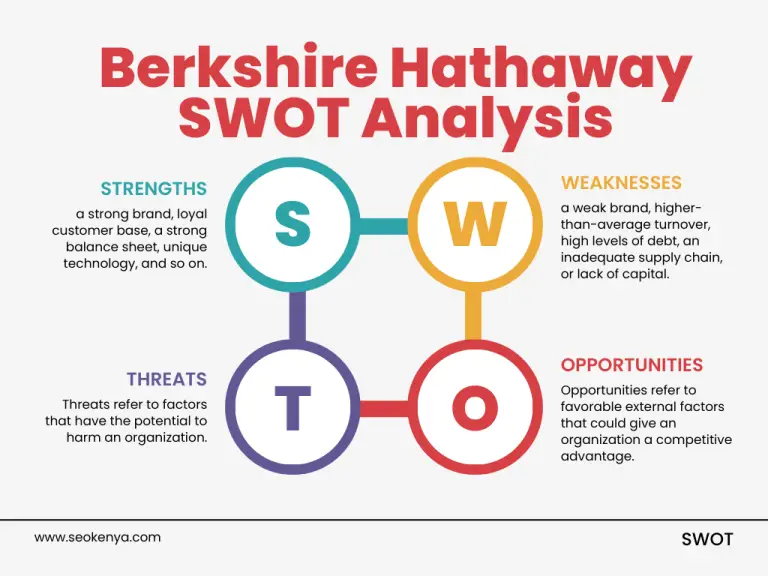In-Depth Tesla SWOT Analysis: A Comprehensive Guide to Understanding the Electric Car Giant
Tesla Motors, Inc. is an American multinational corporation that specializes in electric vehicles, energy storage, and solar panel manufacturing based in Palo Alto, California.
The company was founded in 2003 by entrepreneur Elon Musk with the goal of producing affordable electric vehicles.
Since then, Tesla has become one of the most well-known electric vehicle manufacturers in the world, and its market value has skyrocketed.
Tesla Company Overview
Here’s an overview of Tesla, Inc. in a table format:
| ATTRIBUTE | VALUE |
| Company Name | Tesla, Inc. |
| Founded | July 1, 2003 (Palo Alto, California, U.S.) |
| Headquarters | Austin, Texas, U.S. |
| Industry | Automotive, Energy Storage, Energy Generation |
| Products | Electric Vehicles (Model S, Model 3, Model X, Model Y, Roadster), Energy Storage Products (Powerwall, Powerpack, Megapack), Solar Panels and Solar Roof |
| CEO | Elon Musk (Co-founder and CEO since 2008) |
| Employees | Approximately 127,855 (as of December 2022) |
| Revenue | $81.5 billion (2022) |
| Net Income | $12.6 billion (2022) |
| Market Cap | Approximately $550 billion (as of March 2023) |
| Stock Exchange | NASDAQ: TSLA |
Tesla, Inc. is a pioneering company in the fields of electric vehicles, energy storage, and energy generation. Founded by Elon Musk and others, Tesla’s mission is to accelerate the world’s transition to sustainable energy.
The company is best known for its electric vehicles, including the Model S, Model 3, Model X, and Model Y. Tesla also produces energy storage products like the Powerwall and Powerpack, as well as solar panels and solar roof tiles.

In this article, we’ll perform a comprehensive SWOT analysis of Tesla and gain a better understanding of the electric car giant.
Strength of Tesla
Innovative and Sustainable Products:
Tesla’s electric vehicles are among the most innovative and technologically advanced vehicles on the market. With a focus on sustainability, Tesla’s electric vehicles emit significantly less greenhouse gases than traditional gasoline-powered vehicles.
Strong Brand Image:
Tesla has a strong brand image, which has helped the company to gain a significant market share in the electric vehicle market. The company’s high-quality products and commitment to sustainability have made it one of the most recognizable and trusted brands in the electric vehicle market.
Growing Demand for Electric Vehicles:
The demand for electric vehicles is growing rapidly, and Tesla is well-positioned to take advantage of this trend. With its innovative and high-quality products, Tesla is well-positioned to capture a significant share of the electric vehicle market.
Strong Financial Performance:
Tesla has consistently posted strong financial results, with revenue and net income growing rapidly in recent years. The company’s strong financial performance is a testament to its ability to produce and sell high-quality electric vehicles at a competitive price.
Weakness of Tesla
Limited Production Capacity:
Despite its strong financial performance, Tesla’s production capacity is limited, which has prevented the company from fully capitalizing on the growing demand for electric vehicles.
Dependence on Government Subsidies:
Tesla’s electric vehicles are heavily subsidized by the government, and the company’s financial performance is dependent on these subsidies. The elimination or reduction of government subsidies could significantly impact Tesla’s financial performance.
High Price Point:
Tesla’s electric vehicles are priced significantly higher than traditional gasoline-powered vehicles, which may limit the company’s ability to capture a significant share of the market.
Shortage of Charging Infrastructure:
The shortage of charging infrastructure is a major barrier to the widespread adoption of electric vehicles, and Tesla is dependent on the development of charging infrastructure to support its electric vehicle sales.
Opportunity of Tesla
Expansion into New Markets:
Tesla has the opportunity to expand into new markets, such as China and India, where the demand for electric vehicles is growing rapidly.
Increased Demand for Energy Storage:
The demand for energy storage is growing rapidly, and Tesla has the opportunity to capture a significant share of this market with its innovative energy storage products.
Partnership with Other Automakers:
Tesla has the opportunity to partner with other automakers to expand its electric vehicle market share and increase its production capacity.
Development of Autonomous Driving Technology:
Tesla has invested heavily in the development of autonomous driving technology, and has the opportunity to capture a significant share of this market with its innovative products.
Expansion into Energy Storage and Solar Panel Markets:
Tesla has expanded into the energy storage and solar panel markets, offering customers a complete clean energy solution. The company has the opportunity to further penetrate these markets and become a leading provider of sustainable energy solutions.
Threat of Tesla
Competition from Traditional Automakers:
Tesla faces significant competition from traditional automakers, who are investing heavily in the development of electric vehicles and autonomous driving technology.
Uncertainty Surrounding Government Subsidies:
The future of government subsidies for electric vehicles is uncertain, and the elimination or reduction of these subsidies could significantly impact Tesla’s financial performance.
Economic Slowdown:
An economic slowdown could significantly impact Tesla’s financial performance, as consumers may delay or cancel their purchases of electric vehicles.
Dependence on Key Personnel:
Tesla is heavily dependent on key personnel, especially its CEO Elon Musk, and the loss of key personnel could negatively impact the company’s operations and financial performance.
Political Risks:
Tesla is subject to changing government regulations and policies, particularly in regards to subsidies and incentives for electric vehicles. Any changes to these policies could have a significant impact on the company’s financial performance.
Competition:
The electric vehicle market is becoming increasingly competitive, with established automakers and new entrants investing heavily in the development of their own electric vehicles. Tesla will need to continue to innovate and differentiate itself in order to maintain its competitive edge.
Supply Chain Risks:
Tesla relies heavily on its suppliers for key components, such as batteries and electric motors. Any disruptions to the supply chain could have a significant impact on the company’s production and financial performance.
Conclusion
Tesla has demonstrated tremendous strength and potential in the electric vehicle market. Its innovative and sustainable products, strong brand image, growing demand for electric vehicles, and strong financial performance are all major strengths.
However, the company also faces significant challenges, including limited production capacity, dependence on government subsidies, high price point, and shortage of charging infrastructure.
These weaknesses must be addressed in order for Tesla to continue its success and maintain its position as a leader in the electric vehicle market.
At the same time, Tesla also has several opportunities for growth and expansion, including expansion into new markets, increased demand for energy storage, partnerships with other automakers, and development of autonomous driving technology.
However, the company must also address the threats posed by competition from traditional automakers, uncertainty surrounding government subsidies, economic slowdown, and dependence on key personnel.
Overall, Tesla’s SWOT analysis highlights the company’s strengths, weaknesses, opportunities, and threats, and provides a comprehensive understanding of the electric car giant.
This information can be used to develop strategies to help Tesla continue its success and maintain its position as a leader in the electric vehicle market.



